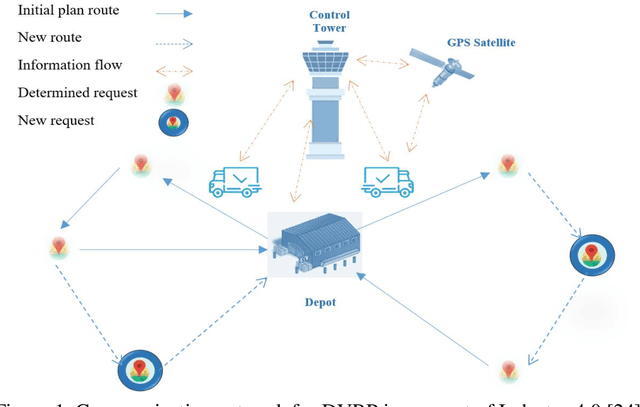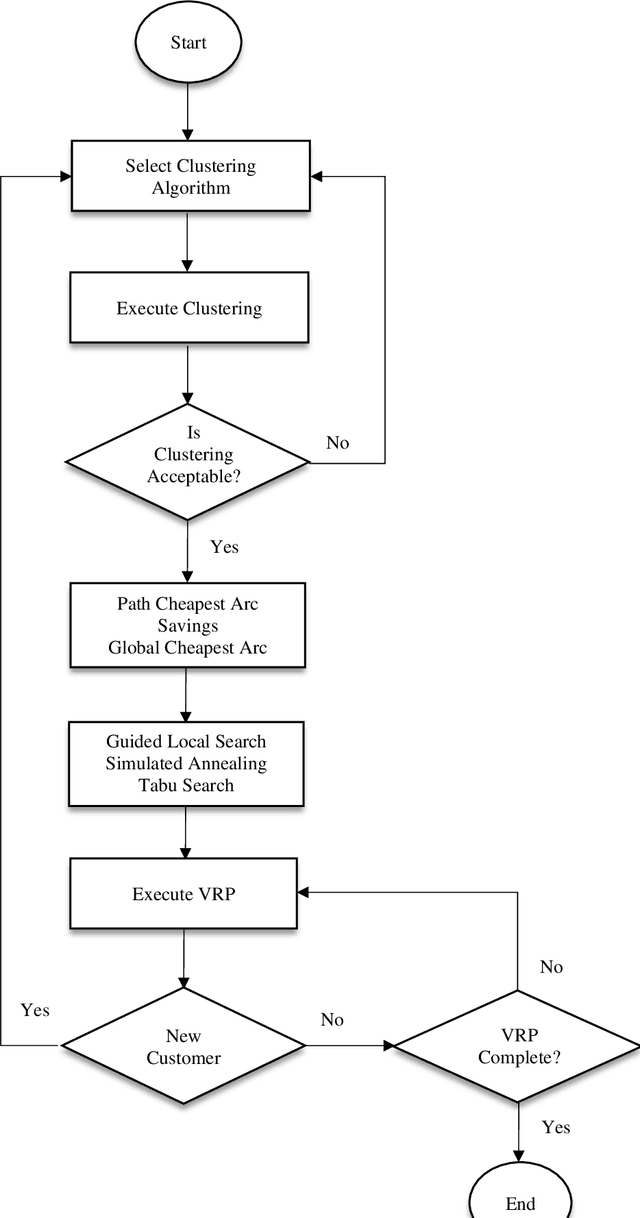Maryam Abdirad
A Three-Stage Algorithm for the Large Scale Dynamic Vehicle Routing Problem with an Industry 4.0 Approach
Oct 04, 2020



Abstract:Industry 4.0 is a concept which helps companies to have a smart supply chain system when they are faced with a dynamic process. As Industry 4.0 focuses on mobility and real-time integration, it is a good framework for a Dynamic Vehicle Routing problem (DVRP). The main objective of this research is to solve the DVRP on a large-scale size. The aim of this study is to show that the delivery vehicles must serve customer demands from a common depot to have a minimum transit cost without exceeding the capacity constraint of each vehicle. In VRP, to reach an exact solution is quite difficult, and in large-size real world problems it is often impossible. Also, the computational time complexity of this type of problem grows exponentially. In order to find optimal answers for this problem in medium and large dimensions, using a heuristic approach is recommended as the best approach. A hierarchical approach consisting of three stages as cluster-first, route-construction second, route-improvement third is proposed. In the first stage, customers are clustered based on the number of vehicles with different clustering algorithms (i.e., K-mean, GMM, and BIRCH algorithms). In the second stage, the DVRP is solved using construction algorithms and in the third stage improvement algorithms are applied. The second stage is solved using construction algorithms (i.e. Savings algorithm, path cheapest arc algorithm, etc.). In the third stage, improvement algorithms such as Guided Local Search, Simulated Annealing and Tabu Search are applied. One of the main contributions of this paper is that the proposed approach can deal with large-size real world problems to decrease the computational time complexity. The results of this approach confirmed that the proposed methodology is applicable.
Detecting Informal Organization Through Data Mining Techniques
Sep 07, 2020


Abstract:One of the main topics in human resources management is the subject of informal organizations in the organization such that recognizing and managing such informal organizations play an important role in the organizations. Some managers are trying to recognize the relations between informal organizations and being a member of them by which they could assist the formal organization development. Methods of recognizing informal organizations are complicated and occasionally even impossible. This study aims to provide a method for recognizing such organizations using data mining techniques. This study classifies indices of human resources influencing the creation of informal organizations, including individual, social, and work characteristics of an organizations employees. Then, a questionnaire was designed and distributed among employees. A database was created from obtained data. Applied data mining techniques in this study are factor analysis, clustering by K-means, classification by decision trees, and finally association rule mining by GRI algorithm. At the end, a model is presented that is applicable for recognizing the similar characteristics between people for optimal recognition of informal organizations and usage of this information.
A Two-Stage Metaheuristic Algorithm for the Dynamic Vehicle Routing Problem in Industry 4.0 approach
Aug 26, 2020



Abstract:Industry 4.0 is a concept that assists companies in developing a modern supply chain (MSC) system when they are faced with a dynamic process. Because Industry 4.0 focuses on mobility and real-time integration, it is a good framework for a dynamic vehicle routing problem (DVRP). This research works on DVRP. The aim of this research is to minimize transportation cost without exceeding the capacity constraint of each vehicle while serving customer demands from a common depot. Meanwhile, new orders arrive at a specific time into the system while the vehicles are executing the delivery of existing orders. This paper presents a two-stage hybrid algorithm for solving the DVRP. In the first stage, construction algorithms are applied to develop the initial route. In the second stage, improvement algorithms are applied. Experimental results were designed for different sizes of problems. Analysis results show the effectiveness of the proposed algorithm.
 Add to Chrome
Add to Chrome Add to Firefox
Add to Firefox Add to Edge
Add to Edge